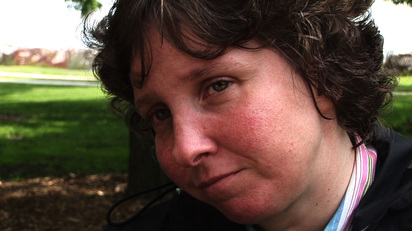Why Alyssa's Story Matters

Alyssa’s technical diagnosis is a “developmental disability,” which fits into a broad category of people with “intellectual disabilities.” This category can include other related conditions such as mental retardation, dementia, learning disabilities such as ADHD or dyslexia. Individuals with intellectual disabilities, or cognitive impairment as it’s also often called, belong to a wide spectrum – from those who live fully independent lives with full-time jobs to those who need around the clock care.
In the United States, there are roughly 20 million people living with developmental disabilities. 85% of adults with disabilities live at home with their parents as dependents. The fact that Alyssa lives on her own with a job and is able to be a productive member of society is a triumph. In addition to a paycheck, her employment at the grocery store, Jewel-Osco, gives Alyssa confidence, social interactions, and respect.
While filming “Lost Child?”, Alyssa’s brother and filmmaker, Greg Ruzzin, had an opportunity to learn more about her rich interior life. For people with an intellectual disability, social communications and interactions can sometimes be limited or challenging. This is richly conveyed through both the patient and caring way Greg illuminates some of Alyssa's more personal moments and interactions, but also through Alyssa's own words. Alyssa is remarkably insightful about her life and this film gives her a voice, a voice to share with us a rare and personal view into her world, her challenges, her passions, and her hopes as well. Alyssa herself clarifies why her story matters when she shares with us her how her willingness to let us in is based in the hope that we will in turn let others with similar challenges into our hearts with greater understanding and appreciation for their struggle.
The film “Lost Child?” can serve as a change agent. For individuals who do not have an intellectual disability, the next time they encounter a person with an intellectual disability, perhaps they will see them not as someone with an impairment, but rather as emotional, thoughtful, and analytical humans with dreams and desires and needs. Like Alyssa, they all have something to teach us about their lives, and ultimately our own.
In the United States, there are roughly 20 million people living with developmental disabilities. 85% of adults with disabilities live at home with their parents as dependents. The fact that Alyssa lives on her own with a job and is able to be a productive member of society is a triumph. In addition to a paycheck, her employment at the grocery store, Jewel-Osco, gives Alyssa confidence, social interactions, and respect.
While filming “Lost Child?”, Alyssa’s brother and filmmaker, Greg Ruzzin, had an opportunity to learn more about her rich interior life. For people with an intellectual disability, social communications and interactions can sometimes be limited or challenging. This is richly conveyed through both the patient and caring way Greg illuminates some of Alyssa's more personal moments and interactions, but also through Alyssa's own words. Alyssa is remarkably insightful about her life and this film gives her a voice, a voice to share with us a rare and personal view into her world, her challenges, her passions, and her hopes as well. Alyssa herself clarifies why her story matters when she shares with us her how her willingness to let us in is based in the hope that we will in turn let others with similar challenges into our hearts with greater understanding and appreciation for their struggle.
The film “Lost Child?” can serve as a change agent. For individuals who do not have an intellectual disability, the next time they encounter a person with an intellectual disability, perhaps they will see them not as someone with an impairment, but rather as emotional, thoughtful, and analytical humans with dreams and desires and needs. Like Alyssa, they all have something to teach us about their lives, and ultimately our own.
Read more from Alyssa at her new blog: |

